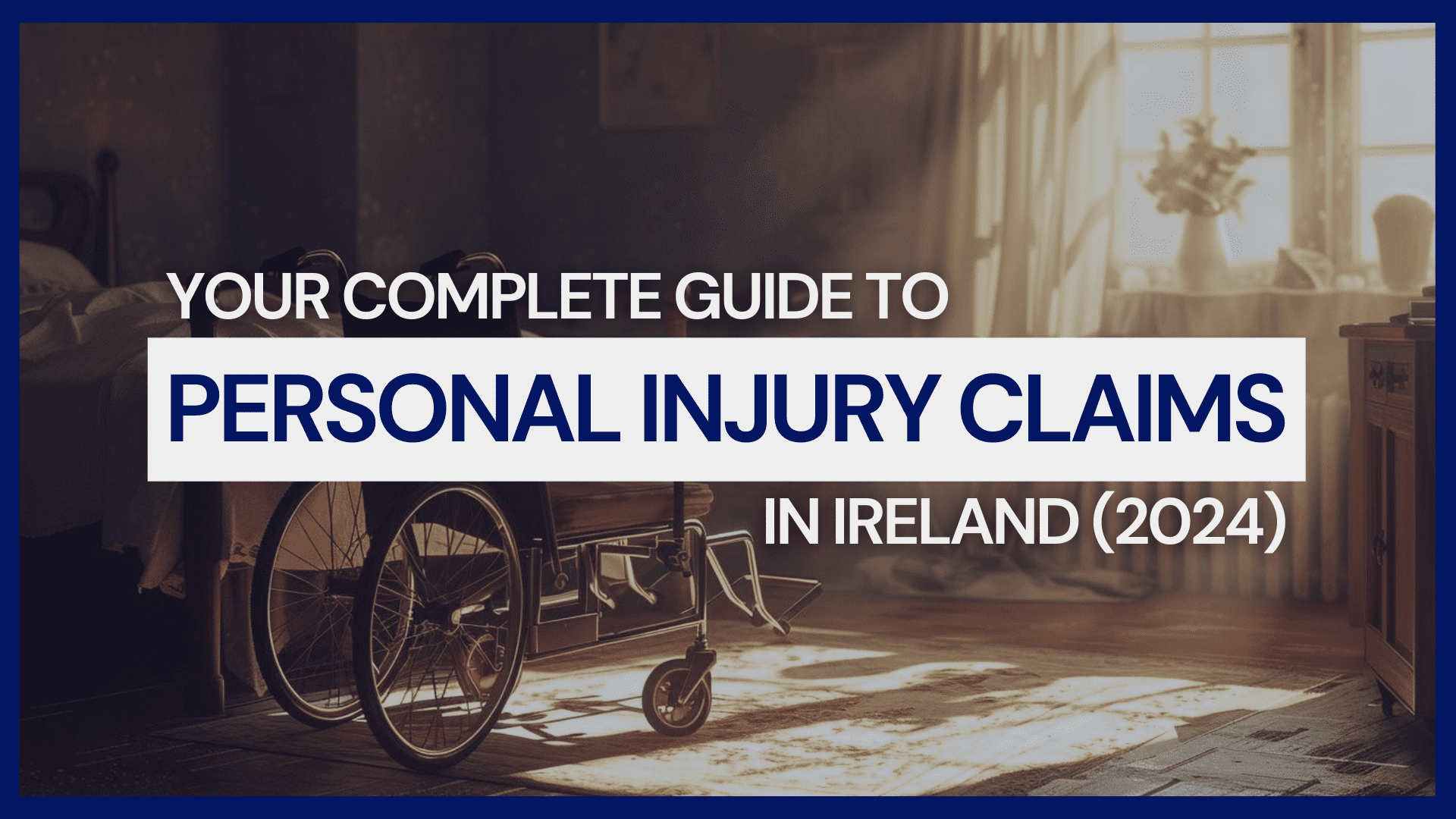Introduction
Navigating personal injury claims in Ireland requires a firm understanding of the process. This guide serves as a crucial tool for individuals facing such challenges.
Whether it’s an accident, workplace injury, or a case of negligence, being informed is essential. Our aim is to simplify the process for everyone involved.
The journey through personal injury claims can seem daunting. The procedures, paperwork, and legal nuances might feel overwhelming. However, this comprehensive guide is designed to alter that perception.
From recognising a valid claim to obtaining compensation, detailing every step can help breakdown the entire process. Packed with actionable advice, strategic insights, and straightforward explanations, you will gain an understanding of your legal rights and the framework for action.
By the end of this guide, you’ll be equipped with the knowledge needed to take decisive steps toward claiming what you deserve. You’ll also discover how to avoid common problems that could impact the success of your claim.
We aim to assist you in moving confidently through the personal injury claims process. The information here will light your path forward, ensuring you’re an informed claimant, not just a bystander.

What is a Personal Injury Claim in Ireland?
Personal injury claims are injuries resulting from someone else’s negligence or failure to act with due care. In Ireland, this broad definition includes a variety of scenarios.
From accidents in the workplace, collisions on the road, to mishaps in public or private spaces, the spectrum is wide. The essence of these claims lies in attributing responsibility to the party at fault. This process aims to redress the harm done to the injured person.
In Ireland, personal injury claims are not limited to physical injuries alone. They also cover psychological trauma resulting from an incident. Whether it’s stress, anxiety, or more severe psychological conditions, if linked to the negligence of another, they form a valid basis for a claim.
This holistic approach ensures that the injured party’s well-being is fully considered. The law acknowledges the multifaceted nature of injuries, emphasising comprehensive compensation.
For a claim to be successful, proving negligence is key. This involves establishing that the responsible party had a duty of care towards the injured person and failed in that duty, leading to injury.
Documentation plays a critical role here. Medical records, witness statements, and photographic evidence are among the tools used to build a compelling case. Understanding these requirements is crucial. It enables the injured party to collect the necessary evidence promptly and effectively.
Furthermore, the impact of a personal injury extends beyond immediate physical harm. Financial losses, such as medical expenses and lost income due to the inability to work, add to the burden. Personal injury claims in Ireland allow for the recovery of these costs.
They also consider long-term effects, including future medical care and potential loss of earnings. Recognising the full scope of what constitutes a claim is the first step towards achieving justice. It allows individuals to take informed action in the wake of an injury.

5 Steps to Make a Personal Injury Claim
Navigating the personal injury claims process in Ireland is a structured journey that demands attention to detail at every step. This guide is designed to walk you through each phase, ensuring you’re well-prepared to pursue your claim.
1) Immediate Action Post-Injury
Prioritising Health and Safety:
-
- The moments following an injury are critical. Your immediate focus should be on obtaining medical attention.
-
- This not only ensures your health is not at further risk but also begins the documentation process of your injuries. Medical reports from this initial care are indispensable evidence for your claim.
Reporting the Incident:
-
- Once you’re safe and have received medical care, report the incident to the appropriate authority. This could be your employer, the owner of the premises where the injury occurred, or local Gardaí, depending on the nature of the incident.
-
- Formal reporting is not just a procedural step; it officially starts the clock on your claim.
2) Documentation and Evidence Collection
Gathering Evidence:
-
- With the incident reported, focus on collecting evidence. This includes photographs of the injury site and any hazards that contributed to the incident.
-
- If possible, gather names and contact information of witnesses. Their accounts can bolster your claim significantly.
Keeping Records:
-
- Document everything related to your injury and its aftermath.
-
- This includes detailed medical records, receipts for expenses incurred due to the injury, and a diary noting any significant pain or milestones in your recovery. This level of documentation paints a clear picture of the injury’s impact on your life.
3) Making Your Claim
Engaging with PIAB:
-
- Making a claim formally in Ireland typically involves the Personal Injuries Assessment Board (PIAB).
-
- You’ll need to fill out a specific application form (Form A) and submit it alongside a Medical Assessment Form (Form B), which your doctor will complete. This step requires meticulous attention to detail to ensure all relevant information and documentation are included.
Seeking Legal Advice:
-
- While not mandatory, consulting with a solicitor before submitting your claim to PIAB can be invaluable.
-
- They can advise on the strength of your case, assist in gathering additional evidence, and ensure your application accurately reflects the extent of your injuries and losses.
4) Assessment and Decision
PIAB’s Review Process:
-
- After submitting your claim, the PIAB’s assessors will review the provided evidence, possibly request further information, and then make an assessment.
-
- This process can take several months, during which PIAB evaluates the seriousness of your injury, its impact on your life, and any financial losses you’ve incurred.
Accepting PIAB’s Offer:
-
- Once PIAB makes an assessment, both you and the respondent (the party you’re claiming against) will be notified of the compensation amount suggested.
-
- If both parties agree, the claim is settled. However, if either party disagrees, you have the option to escalate the matter to court.
5) Settlement and Court Proceedings
Exploring Settlement Options:
-
- Before moving to Court, there’s often an opportunity to settle the claim. Settlement is a negotiation process where you and the respondent agree on compensation without the need for a trial.
-
- Most personal injury claims in Ireland are resolved at this stage. It’s a quicker, less stressful process compared to court proceedings.
-
- Your solicitor plays a crucial role in these negotiations, leveraging the evidence collected to secure a fair settlement that covers your losses and injuries adequately.
Benefits of Settling:
-
- Settling a claim has several advantages. It reduces legal costs and the time it takes to receive compensation.
-
- Settlements also offer a degree of certainty that court decisions do not. Both parties have control over the outcome, which can lead to mutually beneficial resolutions.
-
- However, it’s important not to rush into a settlement without fully understanding the value of your claim. Comprehensive medical assessments and a clear accounting of all losses are essential for an equitable settlement.
Proceeding to Court:
-
- If a satisfactory settlement cannot be reached, the next step is to take the case to court. This phase requires presenting your claim before a judge, who will then make a final ruling on compensation.
-
- Court proceedings demand thorough preparation, including compiling all evidence, coordinating with witnesses, and formulating a compelling argument for your compensation claim.
-
- The process can be lengthy, but it’s sometimes necessary to achieve the compensation you rightfully deserve.
-
- Court proceedings conclude with a judge’s decision, which determines the compensation awarded. This phase underscores the importance of having detailed evidence and strong legal representation.
-
- A solicitor with experience in personal injury claims can provide invaluable guidance and advocacy throughout this challenging process.
Understanding the nuances of settling a claim versus proceeding to court is critical.
Most personal injury claims may indeed find resolution through settlement negotiations. Yet, knowing when to push for court proceedings is key to ensuring you receive fair compensation for your injuries and losses.

Legal Factors in Personal Injury Claims
Navigating the legal aspects of personal injury claims in Ireland is pivotal for a successful outcome.
This enhanced understanding covers crucial points such as the Statute of Limitations, negligence, and the importance of taking action fast.
Statute of Limitations
One of the most critical legal considerations in personal injury claims is the Statute of Limitations.
Under the Statute of Limitations Act 1957 (and its subsequent amendment in 1991), individuals have a two-year window from the date of the accident or realisation of injury to initiate legal proceedings. This timeframe is vital for maintaining the right to compensation.
Special conditions may influence this period, including:
Minors
-
- The clock starts on their 18th birthday. This extends the timeframe for initiating a claim until they turn 20.
Delayed Discovery
-
- If the injury’s full extent becomes apparent later, the two-year period may start from the date of discovery.
Incapacity
-
- Situations where the injured party is incapacitated may also affect the timeframe. For example, being in a coma or mentally unable to manage affairs.
Understanding these nuances is essential. Consultation with a legal expert is recommended to navigate specific circumstances.
Proactive engagement with a solicitor is crucial, as preparation and filing require time well within the two-year limit.
Why Does the Time Limit Matter?
The purpose of this time limit is twofold.
Firstly, it encourages prompt action, ensuring that cases are resolved while evidence and memories are fresh.
Secondly, it upholds the integrity of the legal process by preventing the indefinite hanging of potential claims over individuals or entities.
Common Delays and Their Impact
Several factors can lead to delays in filing a claim, including unawareness of rights, doubts about the claim’s validity, and misconceptions about the time limits.
Procrastination and life’s distractions also contribute. Recognising these obstacles is the first step towards overcoming them.
Immediate consultation with a legal professional can dispel doubts and set the foundation for a timely and effective claim process.
Negligence and Liability
Establishing negligence is central to personal injury claims.
The injured party must demonstrate that another’s breach of duty caused their injury. This legal principle underscores the importance of gathering comprehensive evidence to support your claim.
Getting Expert Legal Guidance
The complexities of personal injury law underscore the value of experienced legal representation.
A skilled solicitor can navigate the subtleties of the Statute of Limitations, evidence collection, and negotiation processes. They ensure that your claim is robust, timely, and positioned for the best possible outcome.

How to Maximise Your Personal Injury Compensation
Securing the best possible outcome in a personal injury claim involves more than just filing within the legal deadlines. Understanding how to maximise your compensation is crucial.
Here are some insider tips and strategies to help you navigate this aspect of your claim:
Document Everything
-
- The foundation of a strong personal injury claim is comprehensive documentation. This includes medical reports, receipts for all expenses related to your injury, and a detailed account of any lost earnings.
-
- Document your recovery process, noting any days of significant pain or milestones in your healing. This diary can become invaluable in quantifying pain and suffering for your claim.
Understand the Full Scope of Your Claim
-
- Compensation in personal injury cases isn’t limited to immediate medical expenses and lost wages. It can also cover future medical treatments, ongoing care costs, and future lost earnings if your injury results in long-term disability.
-
- Emotional distress and loss of quality of life are other factors that can be quantified in your claim. Engage with medical and legal experts to ensure every potential impact of your injury is accounted for.
Don’t Rush to Settle
-
- Insurance companies often offer settlements quickly after an injury. While it might be tempting to settle your claim swiftly, these initial offers are rarely reflective of the full value of your claim.
-
- Take the time to fully understand the extent of your injuries and their long-term implications before considering any settlement offer. Consult with your solicitor to evaluate the fairness of any proposal.
Negotiation Is Key
-
- Negotiation is a critical stage in maximising your compensation. Armed with thorough documentation and a clear understanding of your claim’s value, your solicitor can negotiate effectively on your behalf.
-
- Remember, negotiation is about finding a fair resolution, not just accepting the first offer that comes your way.
Consider the Future
-
- When calculating your claim, think long-term. Injuries can have lasting effects that may not be immediately apparent. Consider future medical needs, potential complications, and how your injuries may affect your ability to earn a living.
-
- Compensation should reflect not just past and present losses but future ones as well.
Get Professional Advice
-
- Navigating the complexities of a personal injury claim can be daunting. Professional legal advice is invaluable in this process. A solicitor specialising in personal injury law can offer strategic guidance, ensure your claim is accurately valued, and advocate on your behalf.
-
- By following these strategies, you can approach your personal injury claim with confidence, armed with the knowledge needed to maximise your compensation.
Remember, a successful claim is not just about proving negligence. It’s also about understanding and articulating the extent of your losses and the compensation required to address them.

How to Avoid Common Problems in Personal Injury Claims
During a personal injury claim, awareness of common pitfalls can significantly influence the outcome. Here’s how you can navigate these challenges to safeguard your claim.
Failing to Document Everything
-
- One common mistake is not documenting every aspect of your injury and its consequences. From the moment of the injury, keep a meticulous record of medical treatments, related expenses, and any impact on your daily life.
-
- This documentation should be comprehensive, including photos of your injuries, detailed notes from medical appointments, and receipts for all expenses incurred due to the injury.
Underestimating the Impact of Injuries
-
- Many claimants prematurely assess the impact of their injuries without considering long-term effects. It’s crucial to understand the full extent of your injuries and how they may affect your life and livelihood in the future.
-
- Waiting for a complete medical evaluation before settling a claim ensures that you’re fully aware of your injuries’ implications.
Accepting Early Settlement Offers
-
- Insurance companies often propose settlements early in the process, hoping to close cases quickly and cost-effectively. Accepting these offers without fully understanding the long-term ramifications of your injuries can result in compensation that falls short of covering your needs.
-
- Always consult with a solicitor before accepting any settlement to ensure it reflects the true value of your claim.
Not Getting Professional Legal Advice
-
- Attempting to navigate a personal injury claim without professional legal advice can lead to missed opportunities for compensation.
-
- Solicitors skilled in personal injury law can provide critical insights into the value of your claim, negotiation strategies, and the legal framework governing personal injury claims in Ireland. Their expertise can make a significant difference in the outcome of your case.
Delaying the Filing of Your Claim
-
- Time is of the essence in personal injury claims. Delaying the initiation of your claim can jeopardise your ability to file altogether due to the Statute of Limitations.
-
- Early action ensures that evidence is fresh and that your claim complies with all legal timelines.
Overlooking Future Costs and Needs
-
- A common oversight in personal injury claims is neglecting to account for future medical costs, potential loss of earnings, and other long-term needs.
-
- An accurate assessment includes current and future impacts, ensuring that any settlement covers the comprehensive scope of your injuries and their effects on your life.
By being mindful of these pitfalls and how to avoid them, you position your personal injury claim for a successful resolution.
Each step taken with caution and informed understanding paves the way toward securing the compensation you deserve. It allows you to address both immediate and future needs stemming from your injury.

FAQs on Personal Injury Claims in Ireland
When navigating the complexities of personal injury claims in Ireland, having clear and accurate information is vital.
Here are some Frequently Asked Questions (FAQs) tailored to provide more guidance:
1) What determines if I have a valid personal injury claim?
To have a valid claim, two primary criteria must be met: the injury should be due to someone else’s fault, and the incident must have occurred within the last two years.
At Nooney & Dowdall, our team can help you understand your rights and assess your situation to determine if you meet these criteria.
2) Is hiring a solicitor for my claim mandatory?
While you are not legally required to hire a solicitor to make a personal injury claim, doing so is advisable. Personal injury can bring physical and psychological suffering, often minimised by insurance companies in direct negotiations.
An experienced solicitor will protect your interests, ensuring your claim accurately reflects the extent of your injuries and suffering.
3) What fees are associated with filing a claim?
Filing a claim with PIAB involves an application fee. Using paper or email submissions, the fee is €90, while online applications require a €45 fee. In addition, your treating doctor will charge a fee for completing the required medical report.
These costs, along with other reasonable expenses, are considered in your final award.
4) How long does the claim process take?
The timeline for PIAB to assess a claim is typically 9 months from when consent is received from the respondent. By contrast, court proceedings can extend over several years. It’s crucial to begin the process early to avoid unnecessary delays.
5) What are the time limits for filing a personal injury claim?
You must notify the respondent of your intent to claim within one month of the incident. The formal claim must then be lodged within two years less one day from the date you became aware of your injury.
This “date of knowledge” could be the day of the accident or later if the injury wasn’t immediately apparent. You can find more information about time limits in the Civil Liabilities and Courts Act 2004.
6) Are there exceptions to what the PIAB assesses?
Yes, the Personal Injuries Assessment Board (PIAB) does not assess certain types of claims.
These exceptions include medical negligence, assault cases, and claims where the injuries are solely psychological. Complexities arising from pre-existing medical conditions might also lead to a PIAB exemption.
7) How are compensation amounts determined?
Compensation is assessed with reference to the Book of Quantum, which provides guideline amounts for various injuries. However, factors like loss of earnings, medical expenses, and other out-of-pocket costs are also considered.
Your solicitor can interpret the PIAB assessment and advise on whether to accept.
8) What is Contributory Negligence?
If you are found to have contributed to the circumstances of the accident or the severity of your injuries, this is termed contributory negligence. It may reduce the compensation amount you’re eligible for.
Experienced legal advice can help minimise the impact of contributory negligence on your claim.
9) Can minors make personal injury claims?
Yes, individuals under 18 can make claims but must do so through a “next friend,” usually a parent or guardian. Minors have until two years after their 18th birthday to file a claim for injuries sustained during childhood.
10) Is compensation from personal injury claims taxable?
Compensation awarded for personal injury claims is generally not taxable. However, income generated from the investment of your compensation may be subject to tax. It’s advisable to consult with the Revenue Commissioners for specific advice.
11) Who pays the compensation if my claim is successful?
The compensation is usually paid by the insurance company of the person or entity (respondent) against whom you’ve made the claim. It’s the responsibility of the respondent’s insurer to settle the award.
12) What if the PIAB assessment is rejected?
If either party rejects the PIAB assessment, an ‘Authorisation’ is issued, allowing the claimant to pursue compensation through the courts.
If both parties accept, PIAB issues an ‘Order to Pay,’ equating to a court award, and the respondent/insurer will issue the settlement.

CONCLUSION
Navigating a personal injury claim in Ireland requires careful preparation and quick action. This guide has covered key steps, how to maximise compensation, and common questions. Our goal is to make the process clear and easy to follow.
Securing a favourable outcome comes from early and informed action, particularly in getting expert legal advice. A solicitor’s expertise can significantly influence your claim’s success, from settlement negotiations to potential court proceedings.
Remember, the journey to fair compensation is marked by diligence in documentation and adherence to legal timelines. With this knowledge, you’re better positioned to advocate for your rights and achieve the compensation you deserve for your injuries.
At Nooney & Dowdall Solicitors, our personal injury claim specialists are ready to support your journey toward recovery and justice. To discuss your case or receive expert legal guidance, contact our team today.




